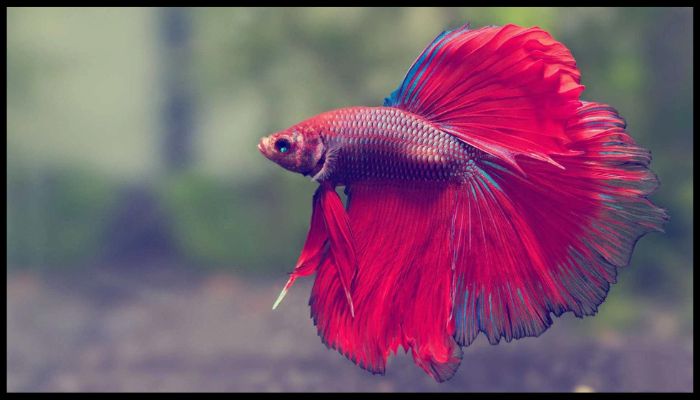If you’re new to the fish-keeping world or simply looking to upgrade your aquarium with some colorful and lively creatures, you’ve probably wondered: What is the best freshwater fish for a tank? Choosing the right fish for your freshwater aquarium is key to creating a thriving environment. Freshwater fish come in a variety of sizes, temperaments, and care requirements, so it’s important to match the fish to your experience level and tank conditions.
This article dives into the best freshwater fish for a tank, providing you with valuable insights and tips to ensure your aquatic setup is perfect for your new pets. Let’s explore some great options and discover what makes them stand out.
10 best freshwater fish for a tank
1. Betta Fish: The Bold and Beautiful
One of the most popular freshwater fish for both beginners and experienced aquarists, the Betta fish is a stunning choice for any tank. Known for their vibrant colors and flowing fins, Betta fish are not only eye-catching but also relatively easy to care for.
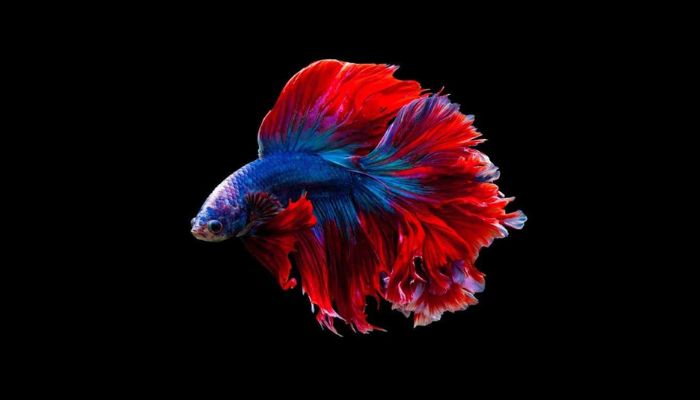
Why choose Betta fish?
- Hardy and adaptable: Bettas can tolerate a range of water conditions, making them ideal for those just starting out.
- Low maintenance: Betta fish don’t require a filter in smaller tanks, although it’s recommended for optimal health.
- Solo swimmers: While Betta fish prefer to be alone (males are territorial), they can thrive in small tanks, making them great for limited spaces.
Diet: Bettas are carnivorous and enjoy a diet of high-quality pellets, frozen or live foods like brine shrimp and bloodworms.
Pro tip: Ensure your Betta has plenty of hiding spots and a heater to maintain water temperatures around 78-80°F.
2. Neon Tetras: Small But Mighty
If you’re searching for the best freshwater fish for a tank that adds both color and energy, Neon Tetras are a fantastic option. These tiny, schooling fish are peaceful and easy to care for, making them perfect for community tanks.
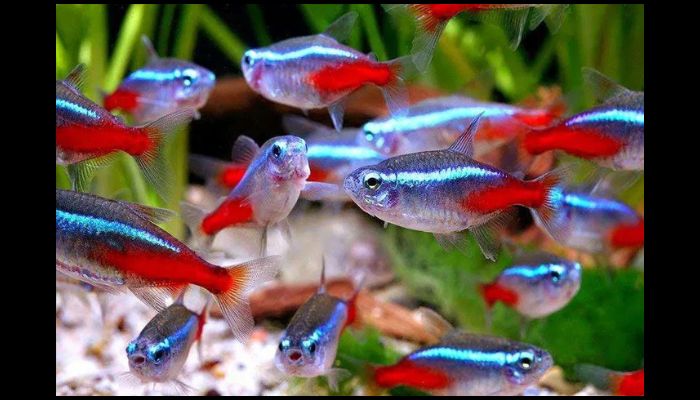
Why choose Neon Tetras?
- Peaceful and compatible: Neon Tetras get along well with most other peaceful fish, making them great for community tanks.
- Low maintenance: They thrive in clean, filtered water and don’t need any special attention beyond the basics.
- Visually stunning: Their iridescent blue and red stripes really stand out in a well-lit aquarium.
Diet: Neon Tetras are omnivores and will eat flake foods, freeze-dried bloodworms, and small pellets.
Pro tip: Keep at least six Neon Tetras together to make them feel secure, and watch them school in harmony.
3. Guppies: The Perfect Starter Fish
When it comes to beginner-friendly freshwater fish, Guppies are hard to beat. Known for their playful personalities and vibrant colors, Guppies are often recommended as one of the best freshwater fish for a tank.
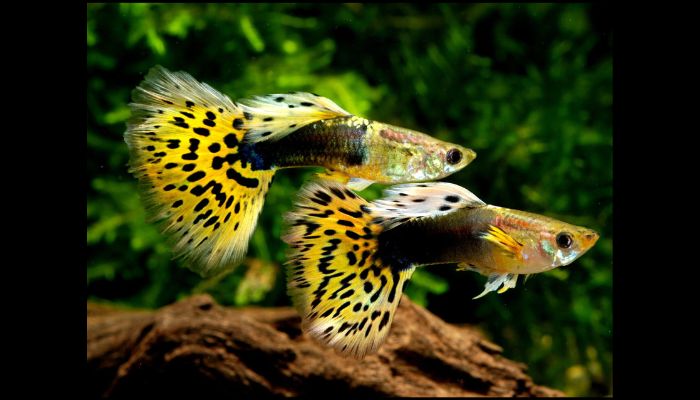
Why choose Guppies?
- Hardy and resilient: Guppies are adaptable and can live in a variety of water conditions.
- Easy breeding: If you’re interested in breeding fish, Guppies reproduce quickly, and you can easily grow your tank population.
- Colorful variety: There’s no shortage of colors and patterns with Guppies, allowing you to create a visually dynamic aquarium.
Diet: Guppies eat a variety of foods, including flakes, pellets, and live or frozen food like brine shrimp.
Pro tip: While Guppies are peaceful, avoid housing them with aggressive species that may nip at their tails.
4. Corydoras Catfish: The Clean-Up Crew
Looking for a fish that not only looks cute but also helps keep your tank clean? Meet the Corydoras Catfish, a bottom-dwelling scavenger that does an excellent job of cleaning up leftover food.
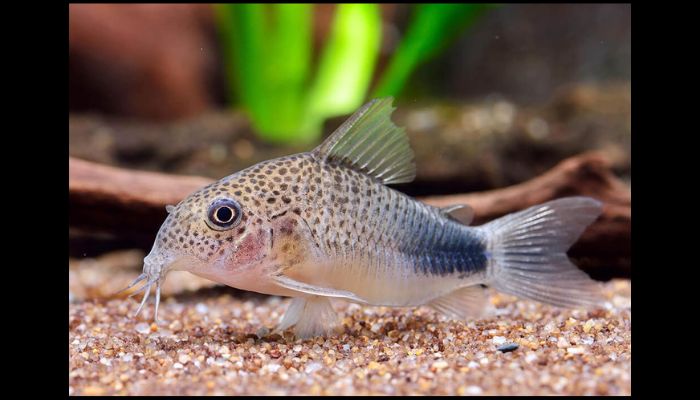
Why choose Corydoras Catfish?
- Low maintenance: These fish are easy to care for and help maintain water quality by eating uneaten food.
- Peaceful companions: Corydoras are non-aggressive and can live peacefully with most other freshwater fish.
- Active foragers: They constantly search the bottom of the tank, adding activity to your aquarium.
Diet: Corydoras are omnivores and will eat sinking pellets, algae wafers, and leftover food that other fish miss.
Pro tip: Keep Corydoras in groups of at least three to five, as they are social fish and enjoy the company of their own species.
5. Platies: Vibrant and Versatile
If you’re looking for hardy freshwater fish for a tank that’s low-maintenance and highly adaptable, Platies are a top contender. These small, peaceful fish come in a wide range of colors and are ideal for both beginners and experienced aquarists.
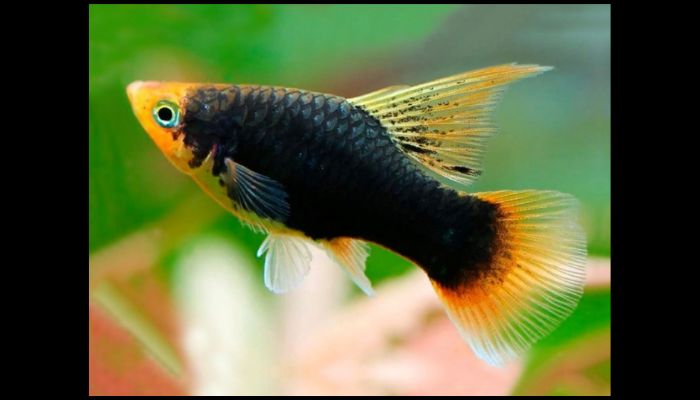
Why choose Platies?
- Hardy and adaptable: Platies thrive in a variety of water conditions and are relatively easy to care for.
- Great for community tanks: They get along well with other peaceful species, making them perfect for a community setup.
- Livebearers: Like Guppies, Platies give birth to live young, so you may end up with a few extra fish if you have a mix of males and females.
Diet: Platies are omnivores and enjoy a diet of flakes, pellets, and frozen or live foods.
Pro tip: Platies are best kept in small groups, and if you want to avoid breeding, keep only males.
6. Angelfish: Majestic and Graceful
For those who want to add a bit of elegance to their freshwater tank, Angelfish are a stunning choice. These fish are larger than many of the others on this list and bring a regal presence to any aquarium.
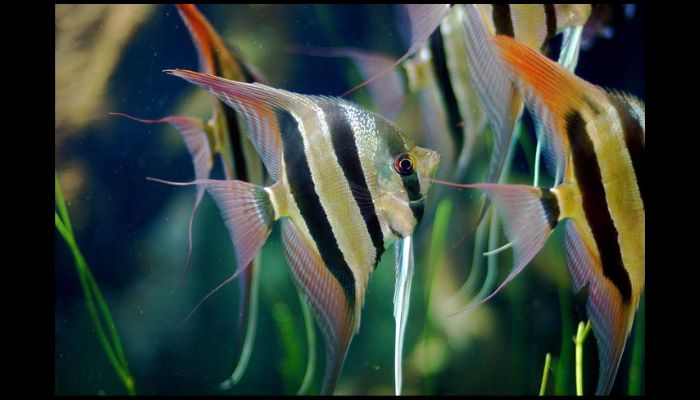
Why choose Angelfish?
- Striking appearance: Angelfish are known for their tall, thin bodies and flowing fins, which create a dramatic effect in the tank.
- Moderate care: While not the easiest fish to care for, Angelfish are still manageable for those with some experience.
- Great centerpiece: Their larger size and unique shape make them a focal point in any tank.
Diet: Angelfish are omnivores and will eat flakes, pellets, and frozen or live foods like brine shrimp.
Pro tip: Keep Angelfish in a tank with peaceful, similarly-sized tank mates to avoid fin nipping or aggression.
7. Zebra Danios: The Ultimate Beginner Fish
If you’re looking for a lively, durable fish that’s great for newcomers, Zebra Danios are a popular choice. These small, striped fish are not only energetic but also highly adaptable.
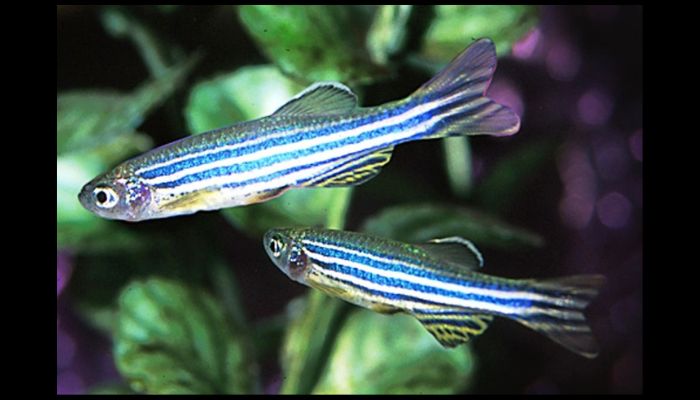
Why choose Zebra Danios?
- Extremely hardy: Zebra Danios can tolerate a wide range of water conditions and are perfect for new tank setups.
- Fast swimmers: These active fish are constantly on the move, making them fun to watch.
- Social fish: They thrive in groups and get along well with other peaceful species.
Diet: Zebra Danios are omnivores and will eat flakes, pellets, and small live or frozen foods.
Pro tip: Keep a school of Zebra Danios (five or more) to see them at their happiest and most active.
8. Swordtails: Sleek and Stunning
If you’re looking for a sleek and active fish, Swordtails are a striking choice. These freshwater fish for tanks are known for the elongated lower part of their tails, which resembles a sword, giving them their name.
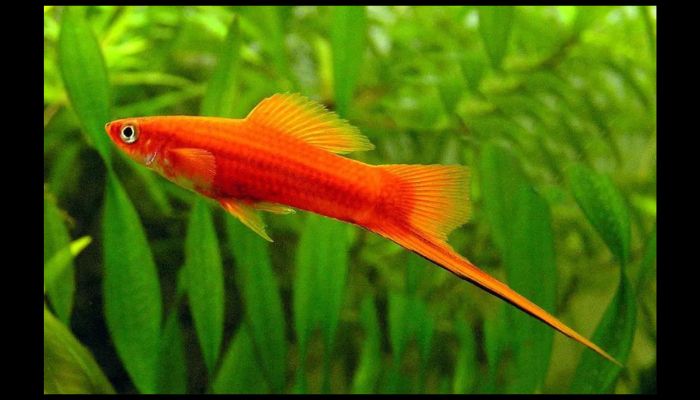
Why choose Swordtails?
- Hardy and easy to care for: Swordtails are adaptable and great for beginners.
- Active swimmers: These fish are constantly on the move, adding life and excitement to your tank.
- Livebearers: Like Guppies and Platies, Swordtails give birth to live young.
Diet: Swordtails are omnivores and will eat flakes, pellets, and live or frozen foods.
Pro tip: Keep Swordtails in groups and provide plenty of space, as they are active swimmers.
9. Mollies: A Colorful and Hardy Option
Mollies are another great option for beginners, thanks to their hardiness and adaptability. They come in a variety of colors and can live in both freshwater and brackish water environments.
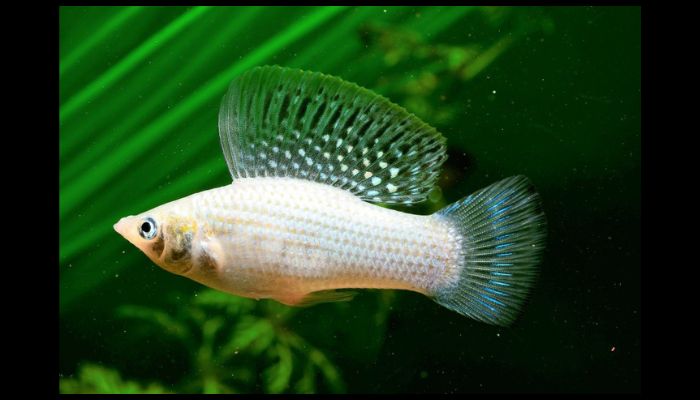
Why choose Mollies?
- Hardy and adaptable: Mollies can thrive in a range of water conditions and are easy to care for.
- Great for community tanks: They get along well with other peaceful species.
- Livebearers: Mollies give birth to live young, similar to Guppies and Platies.
Diet: Mollies are omnivores and enjoy a diet of flakes, pellets, and live or frozen foods.
Pro tip: Mollies prefer slightly brackish water, so adding a little salt to the tank can help them thrive.
10. Goldfish: A Classic Favorite
No list of the best freshwater fish for a tank would be complete without the Goldfish. While they may seem like a basic choice, Goldfish are a timeless favorite for a reason.
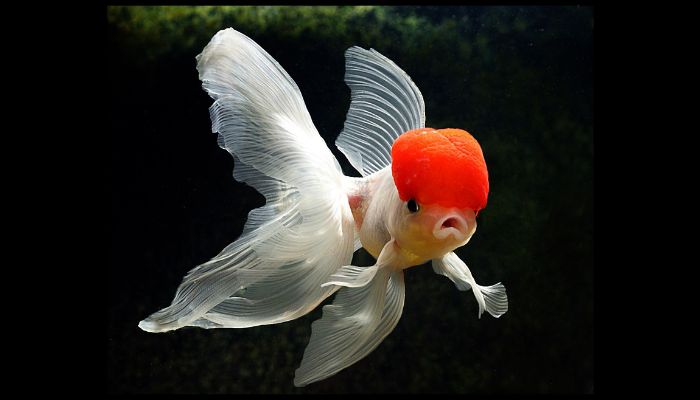
Why choose Goldfish?
- Long lifespan: With proper care, Goldfish can live for over a decade, making them a long-term companion.
- Variety of breeds: From fancy breeds like Orandas to the classic Comet, there’s a Goldfish for every aquarist.
- Coldwater fish: Goldfish can live in unheated tanks, making them ideal for those who don’t want to invest in a heater.
Diet: Goldfish are omnivores and will eat flakes, pellets, and fresh vegetables like peas and lettuce.
Pro tip: Keep Goldfish in a spacious tank with good filtration, as they produce more waste than most fish.
Conclusion
When considering what is the best freshwater fish for a tank, it’s important to think about your experience level, the size of your tank, and the type of environment you want to create. Whether you’re drawn to the bold colors of Betta fish, the peaceful nature of Neon Tetras, or the classic charm of Goldfish, there’s a perfect fish for every tank and every aquarist.
Each of the fish listed here brings something unique to the table, whether it’s ease of care, stunning appearance, or the ability to thrive in a community setup. By understanding their needs and characteristics, you can build a thriving, beautiful freshwater aquarium that you’ll enjoy for years to come.
FAQs: What Is the Best Freshwater Fish for a Tank? Explained
1. What is the best freshwater fish for beginners?
For beginners, the best freshwater fish are hardy, easy to care for, and low-maintenance. Fish like Betta fish, Guppies, Neon Tetras, and Zebra Danios are perfect options. They can tolerate various water conditions, don’t require special attention, and are forgiving of beginner mistakes.
2. Can I mix different species of freshwater fish in one tank?
Yes, you can mix different species of freshwater fish in one tank, but it’s important to choose species that are compatible. Peaceful fish like Neon Tetras, Guppies, Corydoras Catfish, and Platies can usually coexist without problems. Avoid aggressive species or fish that have vastly different needs in terms of water parameters.
3. How many fish should I keep in my tank?
The general rule of thumb is one inch of fish per gallon of water. However, you should also consider the activity level, tank size, and waste production of the fish. For example, larger species like Goldfish need more space due to their size and high waste production. Overcrowding can lead to stress and poor water quality.
4. Do all freshwater fish need a heater in the tank?
Not all freshwater fish need a heater, but many tropical species, like Betta fish, Neon Tetras, and Angelfish, prefer warm water. A heater helps maintain a consistent temperature, usually around 75-80°F. Coldwater fish, like Goldfish, can thrive in unheated tanks.
5. How often should I feed my freshwater fish?
Most freshwater fish should be fed once or twice a day, but it’s important not to overfeed them. Only give them as much food as they can consume in 2-3 minutes. Overfeeding can lead to poor water quality and health issues for your fish.
6. Can I keep Goldfish in a tropical tank?
Goldfish are coldwater fish and generally prefer temperatures between 65-75°F. They may not do well in a tropical tank that is kept at higher temperatures. It’s best to keep Goldfish in a separate, unheated tank or with other coldwater species.
7. What fish are best for a community tank?
Some of the best freshwater fish for a community tank are peaceful species like Neon Tetras, Corydoras Catfish, Platies, Guppies, and Mollies. These fish can coexist with others without causing aggression or stress. Always research the compatibility of species before adding them to a community tank.
8. How do I introduce new fish to my tank?
To introduce new fish to your tank, first, float the bag in the aquarium for 15-20 minutes to match the temperature. Gradually add small amounts of tank water to the bag every 5 minutes. After about 30-45 minutes, use a net to transfer the fish from the bag to the tank, and avoid adding bag water to your aquarium.
9. Do freshwater fish need a filter?
Yes, most freshwater fish tanks need a filter to maintain clean water and good water quality. Filters remove debris, toxins, and excess food, helping to keep your fish healthy. Some species, like Betta fish, can survive in low-filter environments, but it’s still recommended to use a filter for better water conditions.
10. What size tank is best for freshwater fish?
The size of the tank depends on the species and number of fish you want to keep. For small fish like Neon Tetras or Guppies, a 10-gallon tank can be sufficient. Larger fish, such as Angelfish or Goldfish, require more space—at least 20-30 gallons or more. Always consider the adult size of the fish when selecting a tank.
11. How do I keep my freshwater tank clean?
To keep your freshwater tank clean, perform regular water changes (about 20-25% weekly), clean the filter, and remove any uneaten food or waste. Using a gravel vacuum during water changes helps to clean debris from the substrate. Additionally, introducing bottom-dwelling fish like Corydoras can help keep the tank clean by eating leftover food.
12. What is the lifespan of freshwater fish?
The lifespan of freshwater fish varies depending on the species and how well they are cared for. Guppies typically live for 2-3 years, while Neon Tetras can live up to 5 years. Goldfish, with proper care, can live for 10-15 years or more. Providing clean water, a balanced diet, and a healthy environment are key to extending your fish’s lifespan.
13. Can I keep shrimp or snails in a freshwater tank with fish?
Yes, you can keep shrimp or snails in a freshwater tank with fish, but make sure the fish species you choose are not aggressive toward invertebrates. Shrimp, such as Cherry Shrimp, and snails, like Nerite Snails, can coexist peacefully with many species of fish, and they also help keep the tank clean by eating algae and leftover food.
14. How can I tell if my freshwater fish is healthy?
A healthy freshwater fish will be active, have vibrant colors, clear eyes, and show no signs of disease (e.g., white spots, fin rot, or lethargy). Healthy fish will eat regularly and swim without difficulty. It’s important to observe your fish daily for any changes in behavior or appearance to catch any issues early.
15. What is the most low-maintenance freshwater fish?
Betta fish, Guppies, and Zebra Danios are among the most low-maintenance freshwater fish. These species can tolerate a range of water conditions, don’t require elaborate setups, and are generally easy to care for. They are ideal for beginners looking for low-effort but enjoyable pets.
16. How often should I clean my freshwater tank?
Regular cleaning is essential for maintaining a healthy aquarium. Perform partial water changes (about 20-25%) weekly and clean the filter as needed. Gravel should be vacuumed during water changes, and the glass should be wiped down to remove algae. A deep clean (filter, gravel, tank decor) can be done every 4-6 weeks.
